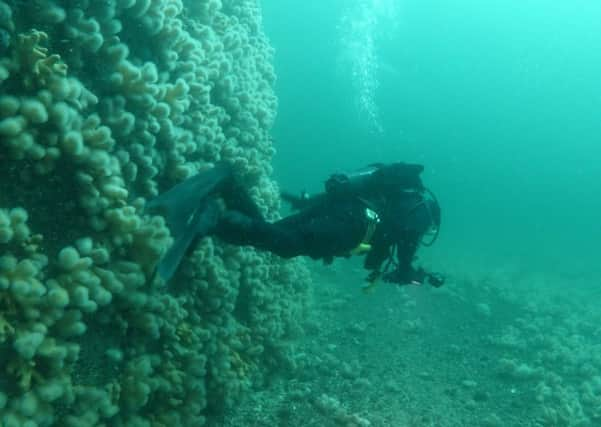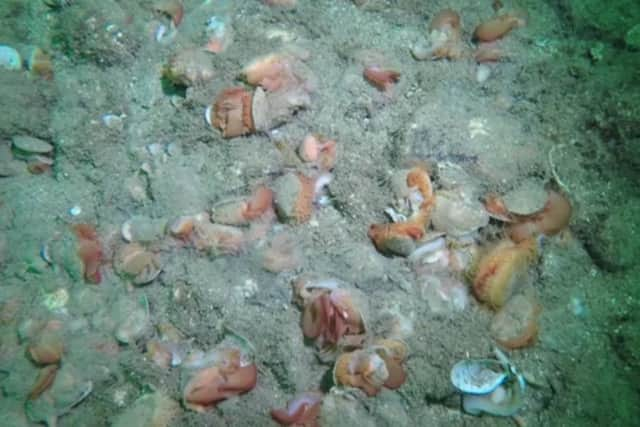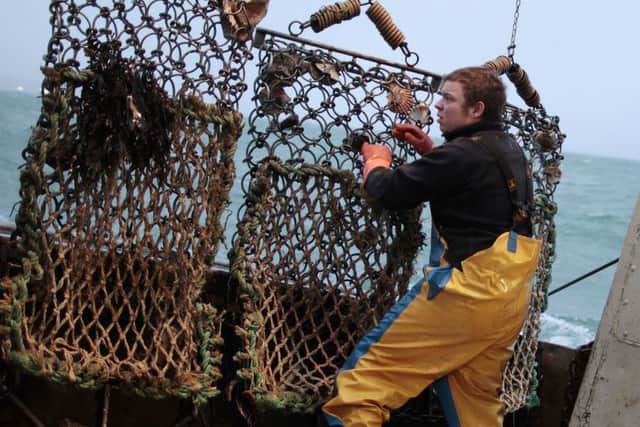Insight: Scottish fishing industry fears radical measures to protect marine life


Loch Carron is a breathtakingly beautiful spot in the northwest Highlands, surrounded by imposing mountains and nature at its most sublime. Less obvious is the beauty that lies beneath the waves. The area is home to rare marine life with international importance.
The seabed hosts the world’s largest known flame shell bed, with an estimated 250 million of the brightly coloured molluscs. The reef provides important habitat and nursery grounds for many other species.
Advertisement
Hide AdAdvertisement
Hide AdToday is a special day for that sea loch and perhaps also for Scotland. An incident took place here two years ago that has proved a turning point in the way the country’s inshore waters are to be managed.


A fishing crew wreaked havoc on the reef while dredging for scallops, leaving barren scars across the seabed and a trail of smashed up marine life in their wake.
The destruction caused outrage among locals and conservationists – not least because the dredger was operating legally since the area had no protected status, despite its rare features.
Scottish Environment Secretary Roseanna Cunningham responded swiftly, slapping an emergency protection order on the loch. The Scottish Government also committed to conducting a full review of the impacts of dredging and bottom-trawling throughout Scotland’s inshore waters.
The inshore extends from the coast out to 12 nautical miles, with most fishing taking place within six nautical miles.


As well as supplying food, the inshore fleet plays an important role in providing employment and income for coastal communities.
It is diverse, including trawlers, creelers, netters, dredgers and divers. Most deploy static gear such as creels and pots to catch prawns, crab and lobster, but mobile methods such as dredging and trawling are also used to target scallops and prawns.
However, the sector faces a range of challenges related to fisheries governance and competing interests such as marine renewable energy projects, fish farms and leisure activities.
Advertisement
Hide AdAdvertisement
Hide AdAfter prawns, scallops are the biggest shellfish catch for the Scottish fishing industry, bringing in around £40 million a year.
Annual landings had been steadily rising, peaking at more than 30,000 tonnes in 2012. But they were down to just over 16,000 tonnes in 2018 – despite more boats targeting the species. The industry remains lucrative due to rising prices, but margins are much tighter.
The fleet currently lacks regulation, with no quotas or limits on catch and no statutory tracking of smaller boats. But these statistics suggest stocks are struggling and could be approaching a cliff edge.
Today the closure of Loch Carron has become permanent and the area has been designated a marine protected area (MPA) for nature conservation.
But environmentalists are concerned that many more rare and vulnerable habitats remain at risk around the coast. They say change is urgently needed to safeguard the health of Scottish seas and ensure the fishing industry is sustainable going forward.
MPAs cover around 20 per cent of the inshore, but dredging is only prohibited from parts of these sites, being permitted across 95 per cent of the entire inshore area, though it’s thought the activity takes place in just 50 per cent of it.
Sustainable fisheries campaigners say what happened at Loch Carron highlights a fundamental problem with the way the fleet is managed. They believe drastic measures are needed to allow environmental recovery, which will ultimately benefit everyone and the country as a whole.
Some suggest a system similar to that in Norway, which has banned trawling and dredging in part of the inshore, should be implemented here.
Advertisement
Hide AdAdvertisement
Hide AdThe charity Open Seas proposes that only low-impact fishing should be allowed within a three-mile coastal zone to encourage sea life to rejuvenate and multiply. It would also reduce gear conflict, which happens when dredgers work the same grounds as static fishers and damage or tow away creels.
Nick Underdown, head of campaigns for Open Seas, says: “We urgently need to transition to more sustainable fishing inshore. We think there should be a presumptive ban on dredging in coastal waters and that the scallop dredge industry should only be allowed access to inshore waters if they can prove their activities are sustainable. This approach works in other places.”
But fishing organisations claim the move is unnecessary and that existing measures, such as restrictions within MPAs, are enough. Some have argued that protections should be in place for “examples” of sea features such as flame shell reefs, rather than all of them.
Femke de Boer, inshore policy officer for the Scottish White Fish Producers’ Association (SWFPA) says better research is needed to prove scallop dredging is as destructive as some people claim.
“Many of our members fish for scallops in inshore waters,” she says. “We do recognise that features need to be protected but it must be proven that dredging actually does damage. If we have been fishing in a place for decades and the marine features are still there then is there really so much damage?”
The SWFPA is part of the Scallop Industry Consultation Group, which is discussing a way forward for the industry and is due to report back soon.
But Underdown argues: “It should be for the industry to prove that they are not doing harm, rather than continuing to hammer our seabed. Any responsible industry should be proactive in how they account for their impacts.
“The industry does not even have a clear understanding of their own footprint. It is extremely sad that just a few dozen vessels can be having such an impact on the fortunes of Scotland’s fisheries.
Advertisement
Hide AdAdvertisement
Hide Ad“Protecting our coastal waters would not just protect the environment, it would generate jobs.”
As part of the Scottish Government’s pledge to improve fisheries management, £1.5 million of funding from Holyrood and the EU has been handed out to install vessel tracking devices on boats under 12 metres long and for research to improve the scientific evidence base.
The results of a consultation on the best way to protect priority marine features considered to be particularly sensitive to bottom-contacting mobile fishing gear are due out soon.
A sustainability appraisal of possible management approaches is also being undertaken, with plans for a public consultation later this year.
Elaine Whyte, executive secretary of the Clyde Fishermen’s Association, feels the debate has been clouded by “sensationalised” reports of illegal fishing and “a dominant narrative” coming through from green groups.
She insists “fishermen are environmentalists too” because their livelihoods depend on it. They already agree voluntary closures and curfews in certain places to avoid overfishing and allow stocks to replenish.
CFA members are fully behind the move to fit tracking systems in all boats, she says, and are working with other associations through the Inshore Fisheries Groups (IFGs) to ensure sustainability.
“We’re fully on board with that because it gives you a much better way to do it, instead of accusations,” says Whyte. “There’s not one single mobile fisherman who is against that. We definitely think accountability is the way to go. It should stop any unfounded claims.”
Advertisement
Hide AdAdvertisement
Hide AdShe conceded there had been incidents where boats not signed up with any fisheries associations had been seen fishing in grounds where a seasonal closure had been agreed.
“They were giving everyone a bad name because of the areas they were going into,” she says.
But she adds that the introduction of MPAs pushed dredgers out of places they had traditionally fished, which could put extra pressure on other areas.
“Scallops are not found everywhere,” she says. “Often it’s in shallow water inshore. It’s going to lead to a decline in landings if areas are closed off, so you might find because there are less places to fish then it can lead to a displacement issue.”
She suggests closures in MPAs could be operated on a rotational basis and kept under continuing review, but introducing a three-mile limit would be “like taking a sledgehammer to crack a nut”.
She says: “The monitoring systems are the sensible way to do it, and also more regular scallop assessments show how things change in the marine environment and where the stock is and where it might be in the future.
“Do we think some closed areas are a good idea? Yes, but there should be a way of rotationally managing it because that makes better sense than permanent closures.
“Also if you were to put in a three-mile limit what it would ultimately mean is that you’re giving over one type of fishing to another type of fishing. We’re of the view that actually it’s probably better to balance it out between types of fishing because it puts less pressure on the environment.”
Advertisement
Hide AdAdvertisement
Hide AdSuch an approach will not satisfy Underdown, who insists that the response must be more urgent and radical. “It is for the Scottish Government to show leadership here. The long-term impacts of damaging dredging are already coming home to roost – we have seen declines in our fishing sector. We need to take action now.”
Open Seas contends that all those who dredge for fish should be supported during a transition to more sustainable fisheries and the whole move needs to be part of a comprehensive plan, delivered in phases so that those who have invested in dredging are not unfairly treated.
Diver Guy Grieve, who runs the Ethical Shellfish Company on the Isle of Mull, collects scallops by hand.
He believes the Scottish Government has a duty not only to protect sea life by banning mobile gear in sensitive areas but also to compensate any fishermen who may lose out in the process.
He argues that Scotland’s international reputation for high-quality seafood depends on keeping the inshore environment as natural and as diverse as possible.
Future management of the fisheries should be holistic and consider the entire marine ecosystem, not just priority features, he says.
“We need to ensure that Scotland’s inshore is kept wild so that we can keep hunting on it and earn a living from it, but also, beyond fishing, so that the marine environment that surrounds all the coastline and islands is full of life, which is great for tourism,” he says.
“If you protect the whole ecosystem then you’re also protecting the human ecosystem.”
Advertisement
Hide AdAdvertisement
Hide AdHe maintains that creel and dive fishing creates a “high-value, low-impact product” and the sector has potential to grow with the right management, benefitting coastal communities and Scotland.
“We would like to expand our businesses and to be able to have some security – our only security is our environment. So that’s why we are rugged environmentalists.
“We also have a responsibility to the next generation to ensure there is habitat that is life-sustaining. And we have a responsibility to the natural environment.
“I would like to see a situation where marine protected areas really are marine protected areas, not a legalistic mosaic of special features. At the moment they’re not. They’re dredged anyway, because there’s no enforcement.”
He believes there could be “an inshore renaissance” if coastal waters were effectively cared for, with great new business opportunities.
However, he accuses ministers of lacking a clear picture of how to go forward. “This whole debate at the moment is just being dominated by tactics,” he says. “There is no proper vision from government. That’s what’s needed to lead everyone through and give everyone the power to move on. It would be wonderful if there was a vision about what Scotland wants.
“There are some of us who want an inshore that is vibrant, fruitful, wild and enriching for the entire human ecosystem, not just an entrenched industrial minority.
“I don’t believe in an unused countryside. That’s where I think the vision should be. What do we want on our doorsteps – a desiccated seabed, or do we want fecundity and life?
Advertisement
Hide AdAdvertisement
Hide Ad“If we had that vision behind all of this stuff it would knit together everything.”
Unsurprisingly, Whyte is worried that the fishing industry’s legitimate concerns are being drowned out by the environmental lobby. She stresses the importance of a neutral body having the final say on how the seas should be managed.
“At the end of the day any kind of fishing has an impact and if everybody was to be truthful that’s what it is,” she says. “I think the honest broker is the government and they are the right people to make the decisions.
“Someone with an honest eye has to look it up and down and make sure there is balance.”
There is one point everyone seems to agree on – that Scotland’s coastal waters urgently need regulation and effective management. Ministers are being called on to step up to the plate and show bold leadership, but it will be difficult to strike the right balance.
Against a background of global protests over a lack of action to tackle climate change targets and the First Minister’s declaration of a “climate emergency”, one of the biggest questions is whether economic or environmental concerns will be highest on the agenda.
There may be a clue in the recent decision to scrap plans to cut air passenger duty due to concerns that the move could raise greenhouse gas emissions by increasing the number of flights.